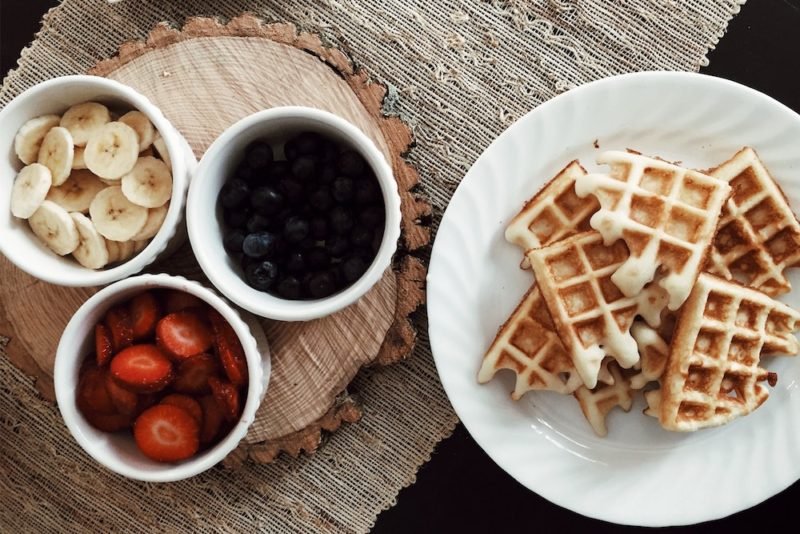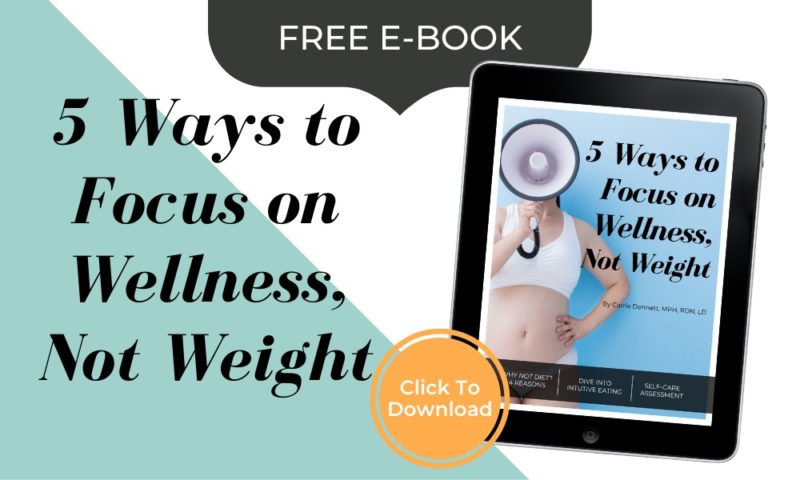
Can you eat intuitively when life is far from “normal”? In other words, as life is right now, as we take fledgling steps away from pandemic life, unsure of what’s to come in the next several months? That’s a question I hear a lot, and I talked about it in my most recent Facebook live a few weeks back (before my life got even nuttier with a house move).
My short answer is a resounding YES!
My longer answer is that there’s no perfect time to learn any new skill or adopt any new habit, and I would argue that there are reasons why intuitive eating is a good idea now more than ever.
Intuitive eating isn’t just about the food
At its core, intuitive eating is about developing interoceptive awareness—the ability to tune into you internal body sensations and using that information to guide you. (The word interoception is Latin for “looking inside.”) These internal sensations include hunger and fullness (as you would expect from intuitive eating), but also your heartbeat, heavy breathing, the need to use the bathroom, and physical sensations triggered by emotions.
I don’t know about you, but I’ve sure been feeling more emotions since this pandemic started…often after watching the news.
When we have strong interoceptive awareness, we have really solid information about our physical and emotional needs that can help guide us to take good care of ourselves.

We need pleasure and satisfaction now more than ever
A dietitian I know has a teenage daughter who has a completely “normal,” uncomplicated relationship with food (bless her). So, no hangups about food, no emotional eating, and so on. But as her family has been sheltering in place, her daughter said to her, “Mom, food is the only thing there is to look forward to now!”
I know some people don’t like it when I say this (I’ve received a number of, “No! Food is only fuel!” emails), but food is supposed to be pleasurable. Not every single meal works out that way, of course (I can think of a few airport meals and new-recipes-that-didn’t-quite-turn-out meals that ended up being about satisfying hunger, and little more), but generally, we should be enjoying our food!
Does that mean that food should be our sole pleasure in life? I would say, no, because that suggests an unbalanced relationship with food. In “normal” life, I see people who do get some enjoyment from their food, but there are other things in their lives that they enjoy much more. I see others (who generally self-identify as “foodies”) who derive far more pleasure from the acts of preparing and eating food. How much pleasure we get from food exists on a continuum, from “food is only fuel” to “food is my only pleasure.” During this pandemic, I think many people have moved up the continuum, not surprisingly, because we need pleasure and bright spots in our lives now, more than ever.
Another of intuitive eating’s overarching ideas is that of satisfaction and pleasure, and this idea is a part of all of intuitive eating’s individual principles.
- When you “make peace with food” you allow yourself to eat what sounds good to you. When you “honor your hunger” you eat when you are gently hungry but not ravenous, which helps you enjoy your food more.
- When you “feel your fullness” you are less likely to eat to the point of being uncomfortably full, which also helps you enjoy your meal more, because you don’t end up in pain!
- Similarly, “respect your body” helps you eat foods that appeal to your tastebuds but also leave you feeling energized and nourished (no matter how much you love cookies, if that’s ALL you ate you wouldn’t feel very good).
- Along those lines, “honor your health with gentle nutrition” helps you steer away from restrictive eating plans that deprive you of some of the foods you enjoy.
- Oh, and then there’s an entire “discover the satisfaction” principle that wraps the other principles together and goes even further than I did in this brief description.
Intuitive eating is an internal practice
As you may have gathered when I talked about interoceptive awareness, intuitive eating is an internal practice. It’s a way to guide your eating that isn’t dictated by external rules. Instead of following the rules of diet culture, or eating in a way that you feel will meet with the approval of others, you eat in a way that appeals to you and nourishes you in a way that supports overall well-being, which includes both physical and mental health.
When you are looking to your own body’s wisdom to guide you—how long do certain foods leave me feeling satisfied, does my food leave you energized or tired, how do your food choices support any health issues you have—you can do that at home as well as you could out in the world, maybe even better.
You might wonder what happens if the foods you prefer as part of the process of intuitive eating aren’t available to you, because you can’t find them or because you are limiting trips to the store. This is certainly an issue, and it’s one that comes up even in “normal” times, such as when someone practicing intuitive eating has a food allergy (they love peanut butter but risk a dangerous allergic reaction if they eat it), or if they struggle with food insecurity and can’t afford their preferred foods. In these cases, do the best you can to get as close as possible to what you want.
Disclaimer: All information provided here is of a general nature and is furnished only for educational purposes. This information is not to be taken as medical or other health advice pertaining to an individual’s specific health or medical condition. You agree that the use of this information is at your own risk.
Hi, I’m Carrie Dennett, MPH, RDN, a weight-inclusive registered dietitian, nutrition therapist and body image counselor. I offer compassionate, individualized care for adults of all ages, shapes, sizes and genders who want to break free from eating disorders, disordered eating or chronic dieting. If you need to learn how to manage IBS symptoms with food, or improve your nutrition and lifestyle habits to help manage a current health concern or simply support your overall health and well-being, I help people with that, too.
Need 1-on-1 help for your nutrition, eating, or body image concerns? Schedule a free 20-minute Discovery Call to talk about how I can help you and explore if we’re a good fit! I’m in-network with Regence BCBS, FirstChoice Health and Providence Health Plan, and can bill Blue Cross and/or Blue Shield insurances in many states. If I don’t take your insurance, I can help you seek reimbursement on your own. To learn more, explore my insurance and services areas page.
 Print This Post
Print This Post







